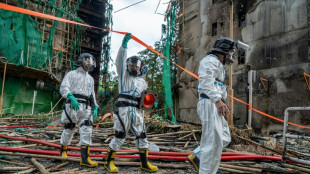
| RBGPF | 1.54% | 79 | $ | |
| CMSC | -0.39% | 23.32 | $ | |
| NGG | -0.61% | 75.65 | $ | |
| AZN | -2.44% | 90.52 | $ | |
| RIO | 0.03% | 71.97 | $ | |
| BTI | -0.91% | 58.13 | $ | |
| GSK | -1.42% | 47.19 | $ | |
| RYCEF | -2.68% | 13.83 | $ | |
| RELX | -1.23% | 39.72 | $ | |
| SCS | 0.55% | 16.38 | $ | |
| VOD | -2.8% | 12.13 | $ | |
| CMSD | -0.13% | 23.29 | $ | |
| BCE | -0.09% | 23.49 | $ | |
| BCC | -1.18% | 75.13 | $ | |
| BP | 1.12% | 36.51 | $ | |
| JRI | -0.15% | 13.78 | $ |

French volunteers hand migrants water beyond the crowded beach
Many others had rushed to the beach to cool off in the heat, but French retiree Sylvie Baudelet and another volunteer were busy handing out water, tea and coffee to thirsty migrants.
"It gives our life a little meaning," said Baudelet near the train station in the seaside town of Wimereux.
From their tea stand, she and her friend offered refreshments and jam sandwiches to dozens of migrants dreaming of crossing the Channel to England.
The group had been hoping to board a dinghy on the beach outside Wimereux but French police drove them out of their hiding place in the dunes.
Among them, a young Somali in his twenties who did not wish to give his name, clutched an unopened water bottle.
"This city, so many tourists," he told AFP in English.
Migrants have increasingly used the Wimereux area as a launching pad for their dangerous trips across the sea in recent months.
A river runs into the sea to the north of the town and people smugglers drive their rubber dinghies down it into the Channel, before taxiing along the shoreline and back towards to beach to pick up their passengers.
Migrants can pay thousands of dollars for a spot on a usually overcrowded boat to venture across one the world's busiest shipping lanes.
At least 17 people have died attempting the sea crossing to Britain this year, after a record 78 lost their lives last year.
- 'Civil resistance' -
In summer in Wimereux, amateur fishermen cast their lines in the morning, beach goers come swimming in the afternoon, and migrants huddle at night waiting to depart at dawn on a small boat.
On the main beach last week, a retired couple emerged in bathing costumes from a pristine blue and white beach hut and set off towards the water.
Teenagers teased a friend with a sunburnt back.
Near the Wimereux station, mostly young men -- but also a few women and older men -- had sought shelter from the scorching sun.
Florence Dufay, a nurse nearing retirement age, bandaged up a man's foot.
Baudelet and Dufay are part of an initiative called "Alors on aide" ("And so we help") set up last summer when makeshift encampments started appearing around town for migrants to spend the night before trying to cross the Channel.
"It's something of an act of civil resistance, because it's unbearable what they are going through," Baudelet said.
When the pair ran out of water, they posted a request on the team's Whatsapp group.
Another volunteer, Catherine Filiatre, showed up barely 10 minutes later.
"I've got 15 litres," she said cheerily.
As she set off with her water and some biscuits to distribute them to various groups of migrants, what appeared to be a French family -- parents and four children -- walked across the tracks in swimming costumes, carrying towels and a parasol.
- Phone charging point -
Even in such heat, the main attraction for the migrants is the small generator that allows them to charge their mobile phones, said another volunteer called Arlet Onel.
"It's the first thing they ask for when they arrive," she said.
Himmat, an Afghan from Mazar-e-Sharif who did not give his age, was among those standing in line for a top-up.
He said he needed to bring his phone back to life so he could listen to a voice note from his parents.
Zabih, an Afghan who said he had lived in Belgium for four years, looked at his travel companions lying in the grass.
"In Belgium, if the people see this, they call the police. Here, they bring us food and water," he said.
But Dufay, the nurse, says not everyone is happy about their initiative.
"Once I was assaulted at the station by someone who said I was a shame on France," she said.
Unlike in bigger cities along the northern French coast, where there are more non-governmental groups helping migrants, in Wimereux residents are often at the forefront of aid.
After boats capsized in two nearby towns in recent months, locals made warm drinks and brought blankets for the survivors shivering near their homes.
Baudelet said she and her husband had sometimes provided shelter to migrants in need.
"This morning, when we were making the rounds, we crossed paths with Egyptians who had stayed with us. The mother hugged me," she said.
L.Spiteri--JdM



